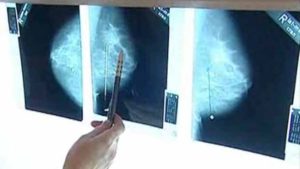 Is the Mediterranean style diet the future in breast cancer prevention? The following study was done in primates, but it makes sense that the results would also be true for humans: that the type of diet eaten influences the breast microbiome. This means the community of microbes that live in the breast. Yes, it's true - studies show that there is a breast microbiome and it varies between those who have breast cancer and those who don't (healthy breasts).
Is the Mediterranean style diet the future in breast cancer prevention? The following study was done in primates, but it makes sense that the results would also be true for humans: that the type of diet eaten influences the breast microbiome. This means the community of microbes that live in the breast. Yes, it's true - studies show that there is a breast microbiome and it varies between those who have breast cancer and those who don't (healthy breasts).
The study looked at macaque monkeys who were fed either a Mediterranean style diet or a Western style diet for 31 months, and then their breast tissue was examined. They found microbial differences in the breast tissue among the 2 groups, including greater numbers (abundance) of Lactobacillus species in the primates that had been eating the Mediterranean diet.
Lactobacillus species are generally considered beneficial to humans (which is why they are added to many foods and supplements) and studies suggest they may have anti-tumor effects. Some research has found microbial differences between healthy and malignant (cancerous) human breast tissue - including lower Lactobacillus numbers or "abundance" in the malignant breast tissue (compared to those with benign breast lesions). Researchers say it suggests that microbial imbalances (dysbiosis) of breast tissue could be a possible driver of breast cancer .
Studies already show that a person's diet influences the gut microbiome. This study shows diet directly influences microbial communities far away from the gut - in the breasts. Unfortunately it is not stated in the study what Lactobacillus species increased in the breast tissue of primates fed a Mediterranean diet. There are many Lactobacillus species, and they are not equal in their effects (as our experiences with Lactobacillus sakei and sinusitis has shown).
Of course more studies are needed, but in the meantime - eat a diet rich in fruits, vegetables, whole grains, legumes (beans), nuts, and seeds. There are many other documented health benefits from a diet rich in those foods (frequently referred to as a Mediterranean diet). The diet is low in processed foods and high in fiber, and rich in "real foods". From Science Daily:
Diet affects the breast microbiome in mammals
Diet influences the composition of microbial populations in the mammary glands of nonhuman primates, researchers report October 2 in the journal Cell Reports. Specifically, a Mediterranean diet increased the abundance of probiotic bacteria previously shown to inhibit tumor growth in animals. ...continue reading "Diet And The Breast Microbiome"

 Research found that postmenopausal women with periodontal disease (gum disease) were more likely to develop breast cancer than women who did not have the chronic inflammatory disease. And it's a bigger risk among those who currently smoke or quit smoking within the last 20 years. The interesting part is the fact that periodontal disease is a bacterial disease and that it results in inflammation. An earlier
Research found that postmenopausal women with periodontal disease (gum disease) were more likely to develop breast cancer than women who did not have the chronic inflammatory disease. And it's a bigger risk among those who currently smoke or quit smoking within the last 20 years. The interesting part is the fact that periodontal disease is a bacterial disease and that it results in inflammation. An earlier  This exciting research opens a whole new way of thinking about the female breast and breast cancer. First of all, note that
This exciting research opens a whole new way of thinking about the female breast and breast cancer. First of all, note that